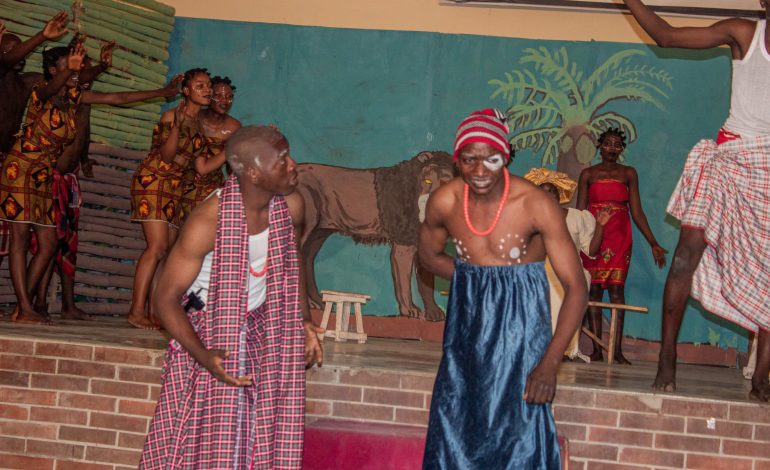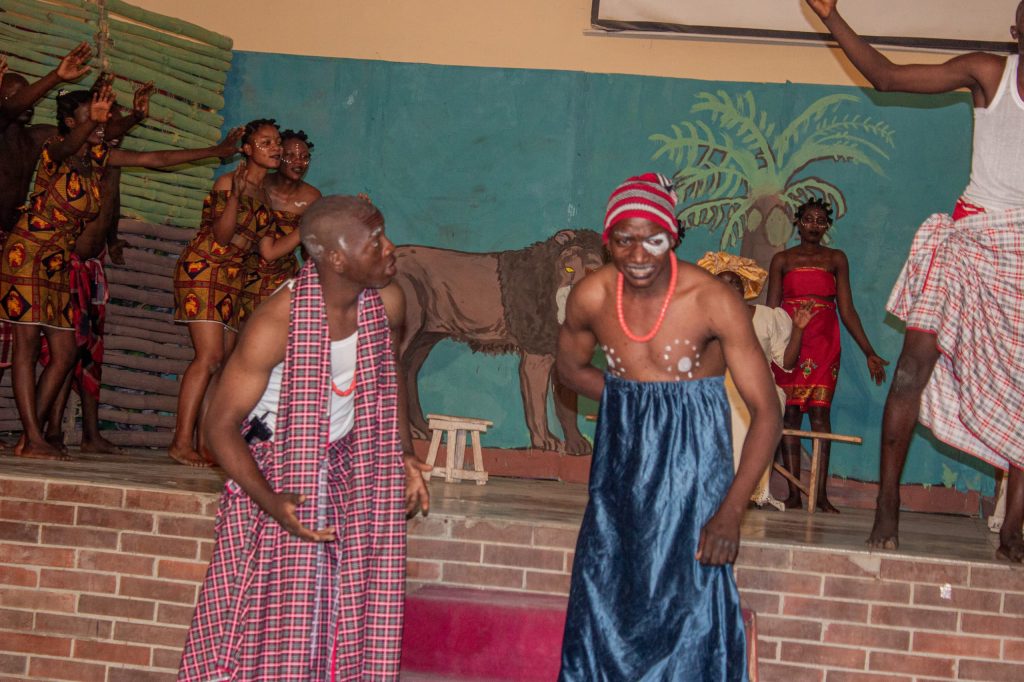Evwierhoma’s ‘The Cut Across’: When modernity tangles with ancient tradition

* Prof. Olu Obafemi, Nollywood actor Simileoluwa Hassan show solidarity
By Anote Ajeluorou
ACROSS Africa, there has been a steady decline in the number of ancient traditional practices. Their disappearance is due largely to the onslaught of modernity. The killing of twins and the osu caste system (that make some people less than human) are cases in point. However, one such African traditional practice that seems to have defied many odds to root it out entirely remains a challenge to campaigners like Prof. Mabel Evwierhoma and her other gender heroines. It’s the scourge of female circumcision or better referred to as Female Genital Mutilation (FGM) on account of the damage done to that sensitive part of a woman’s body.
While relative success has been recorded in stemming it, it still appears in subtle, insidious forms that seem to thwart whatever success has so far been recorded. In ancient times as Evwierhoma records in her play, The Cut Across which premiered at the Convocation Arena of Kwara State University, Malete, on February 7, 2024, duly married young women were put through that horrendous practice of cutting off their clitoris. What was worse, the act took place when the young wife is heavily pregnant and shortly before she puts to bed. The shocking impact of the practice on some young women was usually that some bled to death or when they survived, they would have been robbed of the joys of a healthy sex life. The scare of that terrible encounter with the knife on that vital, sensitive organ often produces lifelong trauma. Some of the women become sexually maimed for life.
It is this female genital mutilation practice, purportedly to contain women’s excessive sexual appetite and prevent a child from being killed by the clitoris during childbirth that Evwierhoma’s sensitive literary antenna beams on in The Cut Across. It is yet another campaign performance to sensitise individuals and communities to the danger of female circumcision with a view to stopping it entirely. Women need to take charge of their sexuality without society’s undue interference. Why should a woman’s body be of any concern to society to want to abridge it just to yield that same body for the sole agency of male satisfaction? Why should women be dictated to what use to put their bodies? Ironically, some fellow women are strident opponents of the liberty that the liberation campaign offers. Although it’s the men who insist on the tradition, it’s women who wield the blunt blades to chop off a piece of their bodies that they have a right to own and enjoy.
A professor of theatre and playwright Olu Obafemi and Nollywood actor Simileoluwa Hassan attended the performance to show solidarity with the playwright and encourage the student performers of the university.
The opening glee is the festive, jubilant ‘Isoko wadooo; Urhobo wadooo; Itsekiri wadooo!’ greetings popular among the Isoko, Urhobo and Itsekiri people of Delta State. The same with the songs of festivity and conviviality, with Uruemu’s mother at the head of the celebration. But while this is going on, we see a procession of a bleeding young women being carried on shoulders across the stage that disrupts the jubilant mood. Even after the blood on the ground is mopped off, it’s clear something is amiss. But Uruemu (shortened to Emu), and her three young friends arrive the village from Europe where she lives with her husband.

A sombre scene from Prof. Mabel Evwierhoma’s The Cut Across, with the chief priest stunned into silence after news of the death of a pregnant woman whose delivery is encumbered by a mutilated genital filters out PHOTO: AYODEJI ADEYEMI
Emu (Okike Adebayo) is a victim of genital mutilation. Having relocated abroad on scholarship and having married over there, she finds it hard to experience the joys of sex on account of a blunt clitoris that tradition bequeaths her since it was cut off, so she could be recognised as a full woman. When she informs her mother, Oni Emu (Favour Ayinde), that arising from what she currently suffers, she will embark on a campaign to stop the practice, her mother asks her if her husband is complaining. Her response is that although her husband is not complaining, she owes other young girls a duty to protect their future from being stolen from them by a tradition that has no basis but on mere superstition.
When Emu informs her village friends of her plans and vows to take action against anyone against her plan, her own female cousin Esiri (Fatima Yakub), not only oppose her but also twists the situation to set the stage for confrontation between Emu and her uncle Pa Emuotor (David Samuels). Emu’s remaining family patriarch is still steeped in tradition and insists that Emu’s mission is misguided and ill-advised. Like all diehard traditionalists, Pa Emuotor does not see reason or need to change the tradition they all grew up to meet and which must be passed onto the future generations. He is specially irked at Emu’s behaviour, because Emu’s mother Oni Emu refuses his advances to marry her after his brother died. This is even as Pa Emuotor’s wife Oni Esiri (Nkem Nelson) is convinced Oni Emu is the one making advances at her husband and antagonises her at every opportunity just to nip any such possible liaison in the bud. Esiri blows Emu’s intention out of proportion and informs her father Pa Emuotor that Emu has vowed to imprison him if he does not relent in the female circumcision tradition, as head of the family. This sparks a row between uncle and niece. Friends Pa Emuotor invites to wade into the matter wash their hands off it, saying it’s a family matter that Pa Emuotor should settle. Pa Emuotor is a quandary over her headstrong returnee niece.
Just about the same time, a pregnant woman, who goes into labour, is rushed to the traditional priest and her husband is a perfect picture of restlessness that cracks up the audience, as he prances the stage with fear and anxiety etched all over him. What becomes the fate of his wife? Just like many others, she’d been circumcised and is finding it hard to give birth. When the priest emerges from the inner room, he’s unable to lend words to what has happened. The expectant husband collapses at the personal tragedy he suffers that also resonates throughout the community. Of course, this tragedy spurs Emu on the correctness of her campaign. She then turns to her friends who are visiting with her for advice: how does she go about her campaign? They advise a door-to-door campaign as the most effective one, so everyone is directly reached.
When this happens, it sparks a protest in the community against the practice and forces the paramount ruler (Emmanuel Akintola) to summon everyone to a meeting at the town square. Already, some of the elders have laid charges against Emu for disrupting the peace of the community with her campaign against female circumcision. Some of Emu’s mother’s friends in the marketplace also turn against her for allowing her daughter to breach age-old tradition. They accuse her of allowing her wayward daughter to infect the village girls of a streak of stubbornness that will begin to upend the community’s peace. Emu’s mother has to endure the taunts, but there are a few who see reason and side with her and Emu.
At the village square, charges are brought against Emu before the paramount ruler. When he invites Emu to make her defence, Emu seizes the opportunity to explain the irrationality of the practice and why their community is bearing the tag of backwardness, as other communities around have since stopped the practice. The paramount ruler weighs her words in the light of what he knows and gives verdict that elicits jubilation among the populace, although some, like Pa Emuotor, find it hard to swallow the verdict.
The Cut Across was directed by Oluwatofunmi E. Olusola (a 400 level student), who executed the performance in a pitch perfect way. Theatre guru Prof, Olu Obafemi, who also saw the performance, was quick to give the director credit for managing the large crowd of over 100 cast members so effectively and efficiently. Adebayo (Emu) was also flawless in her delivery and in the carriage of her lead role. For a play that is far removed from its original Niger Delta setting, the performers deserve accolades for their interpretation even if the drumming sometimes sounded off key and jarring. And as a university that prides itself on community development, The Cut Across could either be taken to town (if a venue can be found for it) or the community is invited to the university to see the play and assimilate its message. This is so because the problem of female genital mutilation is not peculiar to the Urhobo or Isoko alone. While it may not be as pervasive as it used to be, hospitals are perhaps the next places to take the campaign. There’re still some nurses and midwives still wired the wrong way who, with or without the consent of parents (particularly mothers), nip off the clitoris of newly girls delivered. Eternal vigilance is therefore required to stem the practice in all its manifestations.
Overall, it was a great performance (all actors were 100 & 200 level students!) but it was occasionally marred by technical input, particularly sound quality, as some of the body microphones did not work and spoilt effective line delivery. Some of the actors were in a rush to say their lines. The audience members strained most of the time to catch what was being said on stage. What made it worse is the university’s Convocation Arena (CVA) where the performance took place. Not being a purpose-built performance venue, it does not have the right acoustics to help delivery by actors. Sadly, it’s the only venue the Department of Performance Arts has to train its students. Indeed, this is less than satisfactory. While there’s always emphasis on actors being able to carry their voices to the end of a performance hall, in an open hall as CVA, this is certainly not possible except the actors want to strain their vocal cords to breaking point.
Most university auditoriums like the ones at the Universities of Lagos and Benin, Benin City, among others, are soundproof since they were designed to serve many purposes, including drama performances. The University of Ibadan has its dedicated performance space, so also the University of Port Harcourt that has ‘The Crab’, the right acoustics. Asking Kwara State University to build a separate theatre for its performance department will be a burden on a lean university purse, but it can’t be otherwise. It’s why university facilities are well thought-out with future multi-dimensional use in mind before they are built. This is therefore a challenge to Kwara State University, Malete, to build a dedicated performance space for its performance arts department. It is clear that with the performance of The Cut Across, the department is on track in the training of its students, who showed immense promise. Building a dedicated performance space is a duty the university owes the Department of Performance Arts, as its own experimental theatre laboratory.



